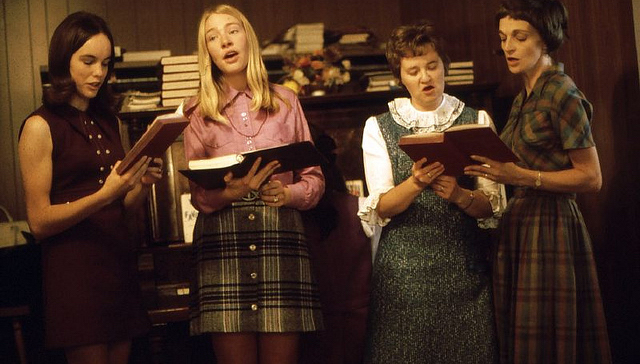Politics in the United States is no more corrupt or crazy than anywhere else. Certainly there has been no shortage of scandals (from Teapot Dome to Watergate) and systemic corruption (Tammany Hall, Chicago up to and including the present day), but one needn’t be an avid student of history to find similar sorts of things in any the major industrialized states one cares to study.
But today, the US is at the tip of the spear of a change being wrought upon liberal democracies. It is conceivable that we are living in the last days of the political as we have known it in the postwar era.
Many of the changes taking place in the public spheres of advanced democracies have been occurring over long time frames. This is particularly true with regard to the spectacularization of politics. Taking as a premise that the scope of political debate in the public sphere since the Second World War has been limited to more and less Keynesian versions of liberal capitalism, the decline of serious public consideration of these matters has been in process since the end of the postwar boom. To take one particularly visible example, the change in the structure and function of party conventions illustrates the transformation of US politics from elite competition through substance to a pure theory of the spectacle.
The year 1968 was a watershed for this process. The open competition between factions and programs that occurred at the Democratic National Convention can hardly be imagined under present circumstances. This is due in part to the determination of both parties to avoid such unseemly scenes through more thorough scripting and shaping of public events. The rise of the media consultant in US politics has been an apt marker for a change whose roots are at a much deeper level.
Guy Debord wrote in The Society of the Spectacle “… just as early industrial capitalism moved the focus of existence from being to having, post-industrial culture has moved that focus from having to appearing.” With regard to the technical aspects of party political practice, the change has been from substantive political analysis to communities of common emotion (founded principally on communities of common appearance).
In a previous essay I claimed the the concept of ungovernability that was central to the early theorizing of the Trilateral Commission was, in fact, the dying gasp of old style conservatism as it was giving way to the rising power of neoliberalism. For neoliberalism, ungovernability is a positive rather than a negative feature of modern mass polities. Rather than combat an ungovernability of the left, an ungovernability of the political right was created with a number of interrelated consequences. Techniques and rhetoric pioneered by the radical left in the 1960s and 1970s, such as the language of individual freedom and inclusiveness were turned to the purpose of coalescing political formations functional to the maintenance of capital accumulation.
These formations had (and have) distinctive class character. At the top end, there is valorization of extreme wealth, coupled with agonized bleating against any criticism (actual or perceived) of the hyperwealthy. At the bottom end, the rhetoric of individual freedom is employed to create a certain solidarity between between the petit bourgoisie (whose interests such rhetoric might conceivably serve) and those lower down the income distribution (to whose interests it definitely runs counter).

One is here reminded of Anatole France’s comment that, “[t]he law, in its majestic equality, forbids the rich as well as the poor to sleep under bridges, to beg in the streets, and to steal bread.” It is thus that a large swath of the American electorate, many of whom are dependent on government programs for food, to say nothing of healthcare and other “higher order needs” are prompted to vote against their interests by the promise that the wealthy will provide them with jobs (at which point they won’t want to pay taxes), heavily alloyed with old school xenophobia and race-baiting.
The smoothing of the political topography creates a greater scope for the politics of the spectacle, but also has the effect of depoliticising (and thus creating a situation of auto-disenfranchisement) of significant segments of the lower end of the income distribution. Whereas low voter turnout used to be a matter of concern for the major political organs of the modern mass democracies, it now tends to be viewed as facilitating a narrower and more effective deployment of politico-economic resources.
It is against this background that one must view the presidential electoral process currently kicking off in the United States. The current president has for the last eight years been a hate figure for the political right. The prediction by martial arts B-movie actor Chuck Norris that Obama’s reelection would result in “1,000 years of darkness” was, in fact, one of the more civilized of the prophecies of doom emitting from the rightward extremes of the political spectrum. The fact that Obama’s actual politics have been slightly to the right of Ronald Reagan’s, or that he expanded the drone war to an extent to which the preceding Bush administration never came close, cut little ice with his most fanatical detractors.

The candidates to succeed him on the Democratic currently include the unelectably socialist (actually moderate liberal) Bernie Sanders and Hillary Clinton whose politics seem reside comfortably with those of Obama on the moderate center-right. Further to the right, the choices shift increasingly in the direction of the ridiculous. Putting aside his recent setback in Iowa, the Republican frontrunner is still the real estate mogul Donald Trump. His vast wealth seems to many in the U.S. electorate as a sign of the favor of heaven, although his multiple bankruptcies and the fact that his original wealth derived from inheritance are less commonly remembered. His whole personal exemplifies the following passage from Marx’s Economic and Philosophic Manuscripts of 1844:
Money’s properties are my – the possessor’s – properties and essential powers. Thus, what I am and am capable of is by no means determined by my individuality. I am ugly, but I can buy for myself the most beautiful of women. Therefore I am not ugly, for the effect of ugliness – its deterrent power – is nullified by money. I, according to my individual characteristics, am lame, but money furnishes me with twenty-four feet. Therefore I am not lame. I am bad, dishonest, unscrupulous, stupid; but money is honoured, and hence its possessor. Money is the supreme good, therefore its possessor is good.
Further still toward the rightward pole we find figures like Ted Cruz, Marco Rubio, and Ben Carson anxious to court the lunatic base by showing that they are willing to stand behind the most ludicrous positions, from spreading US military force to climate change denial. Ultimately whatever they say about other matters is mere window dressing for one version or another of extreme austerity politics, occasionally even including the possibility of a return to the gold standard. The fact that this would almost certainly result in the most catastrophic bout of deflation ever seems lost on people who seem never to have bothered to acquaint themselves with even the most basic propositions of macroeconomics.
Putting aside for a moment what Bernie Sanders might believe about the economy (since he had no chance of becoming president) the only remaining choice is Clinton, which essentially amounts to Reaganism with a human face. So the American voter who wishes to stay within the confines of bourgeois politics and is neither fabulously wealthy nor completely insane is left with the choice between Hillary Clinton and someone who is likely to cause the US economy to collapse in the short term.
It is arguable that this amounts to a transformation of politics in general, with the range of choice (and thus the level of uncertainty for owners of capital) is dramatically reduced. Combined with the condition of the legislative branch, which has been gerrymandered into eternal gridlock, we now have a situation in which the political class in the United States is now playing out the scene from Blazing Saddles, in which Cleavon Little escapes an angry crowd by pointing a gun at his own head…
Photographs courtesy of judlycrook, Omar Bárcena, and Laity Lodge Family Camp. Published under a Creative Commons license.





